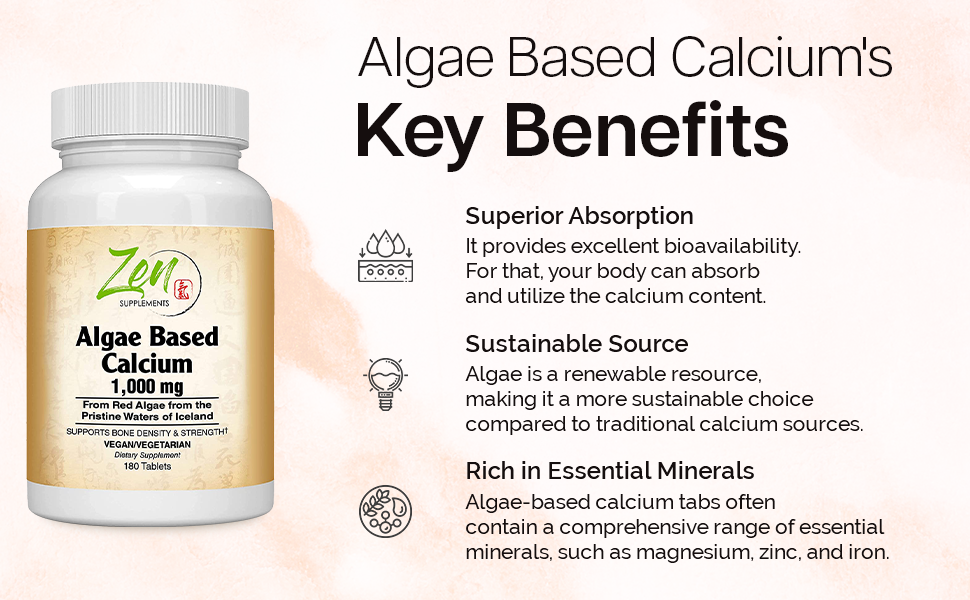Calcium is essential for strong bones, but simply ingesting enough calcium isn’t enough. To effectively absorb calcium from the gut and ensure it ends up in bones — rather than in soft tissues like arteries — the body relies heavily on two fat-soluble vitamins: Vitamin D3 and Vitamin K2. Combined with a mineral-rich source of calcium (such as algae-derived calcium), these nutrients work in synergy to promote bone strength, reduce risk of fractures, and maintain bone health as we age.
In this post, we’ll dive into the mechanisms by which D3 and K2 guide calcium into bones, the scientific evidence, and what to consider when choosing a supplement.
How Vitamin D3 Helps with Calcium Absorption
-
Enhancing Intestinal Absorption
Vitamin D3 (cholecalciferol) is converted in the liver to 25-hydroxyvitamin D, and later in the kidneys to its active form (1,25-dihydroxyvitamin D). This active form increases expression of calcium-binding proteins in the intestines, improving how much calcium from your diet or supplement is absorbed. -
Maintaining Blood Calcium Levels
If blood calcium dips, vitamin D helps the body compensate — by increasing absorption, reducing excretion, or mobilizing calcium from bone. Over time, however, if dietary or supplemental calcium is insufficient or if other cofactors are missing, this can weaken bones.
The Role of Vitamin K2: Directing Calcium Where It Belongs
-
Activation of Proteins that Bind Calcium in Bone
Vitamin K2 is required for the carboxylation (activation) of osteocalcin, a protein produced by osteoblasts (bone-forming cells). Activated osteocalcin binds calcium and helps incorporate it into the bone matrix. Without K2, osteocalcin remains undercarboxylated and less effective. -
Preventing Soft Tissue / Vascular Calcification
Another K2-dependent protein, matrix GLA protein (MGP), helps prevent calcium from depositing in arteries and other soft tissues. This means that with sufficient K2, calcium is more likely to go into bones rather than accumulate in places where it could cause harm.
Synergy: Why D3 + K2 Together Is More Effective Than Either Alone
| Benefit | What Happens When Both Are Present |
|---|---|
| Increased Bone Mineral Density | Studies show that combined supplementation (Calcium + D3 + K2) leads to greater improvement in bone density in post-menopausal women than when only calcium is used. |
| Lower Risk of Misplaced Calcium | With D3 alone, excess calcium could be absorbed but not properly directed, increasing risk of vascular calcification. With K2 in place, proteins like MGP help keep calcium deposition where it should be. |
| Better Bone Turnover Markers | Measures like undercarboxylated osteocalcin drop when K2 is added, indicating that more of the osteocalcin is active and contributing to bone formation. |
Evidence from Clinical Trials & Research
-
A 2017 narrative review “The Synergistic Interplay between Vitamins D and K for Bone and Cardiovascular Health” found that optimal concentrations of both vitamins are beneficial for bone mineral density (BMD) and help reduce risk of soft tissue calcification.
-
A 2023 multicenter trial investigating supplementation with D3 + K2 suggested benefit in slowing down unwanted calcification processes within certain patient groups.
-
Review of calcium, vitamin D, K2, and magnesium supplementation points to improved bone and muscle health outcomes, particularly in aging populations.
Putting It All Together: What to Look for in a Vegan Calcium Supplement
If you’re considering using a supplement (especially algae-based calcium) that includes D3 & K2, here are key factors:
-
Dose of Vitamin D3: Enough to support calcium absorption, considering sunlight exposure, diet, age.
-
Type of Vitamin K2: MK-7 is often preferred for its longer half-life and efficacy.
-
Amount of Calcium & Other Minerals: A well-rounded formula with enough elemental calcium and trace minerals helps bone matrix strength.
-
Quality & Purity: Vegan sources, third-party testing, minimal additives.
-
Balanced Formulation: Ensuring D3 and K2 are present in amounts that work synergistically (i.e. avoid very high D3 with insufficient K2).
Boost Absorption & Support Bone Strength — Try Our Algae-Based Calcium + D3 & K2 Formula
Conclusion
Vitamin D3 and Vitamin K2 are essential partners in the journey of bone health — D3 helps you absorb calcium, and K2 ensures that calcium is deposited into your bones (not your arteries). Using these together, especially with a high-quality calcium source like algae-based calcium, provides a more complete, effective strategy for maintaining and improving bone strength. If you’re looking to support your skeletal health for the long term, this synergy is well-worth exploring.

